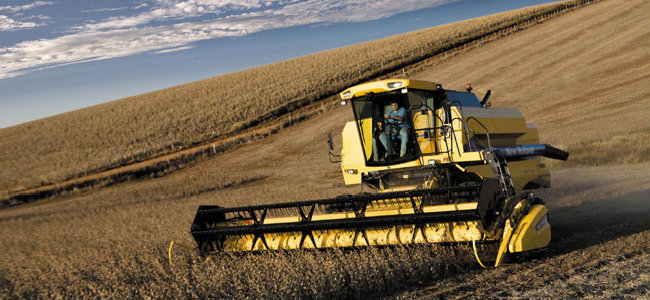
Brazil is becoming is an agricultural superpower and it is growing bigger all the time. I look forward to seeing the changes but until I get there I studying through the Brazilian media. I have been reading a lot about mechanization of Brazilian agriculture and the expansion of the agricultural frontier.
Some crops still need to be picked by hand and there is plenty of nasty, dirty work in the fields, but a lot less. For example, sugar cultivation & harvesting used to be one of the most difficult and sometime brutal parts of agriculture. The cane has sharp leaves that need to be burned off. There are snakes and lots of chances to get hurt or killed. (I read that plantation owners in the old South used to sometimes hire “free” labor, especially Irish immigrants, to do the dangerous work rather than risk slaves.) Those days are gone. Today most of cane is harvested mechanically. I saw the machines at work. They are like those big corn harvesters. The machines harvest and process the product, virtually eliminating the need for unskilled labor. On the other hand, it creates places for skilled labor and Brazil doesn’t have enough of it, according to press reports.
Brazilian government training programs, in cooperation with firms that make the new machines and chemicals such as Syngenta, John Deere e Case IH. The chemicals and seeds are complicated. The machines run with GPS and other electronics. The new techniques require more than just the ability to read and write.
An article read today about technologies in the farm field talked about all these things and pointed out the machines are getting bigger and bigger as farms in places like Mato Grosso are getting bigger and bigger. The new machines require much more sophisticated operators. Some even drive themselves using GPS. What the modern farm needs are workers who can plant the plantings & harvests and keep the machines running. These guys are a lot more likely to be or resemble technicians & scientists than they are like peasants of field workers of old.
Brazilian media reflects the ambiguous relationship that much of the world feels with China. China is now Brazil’s biggest trading partner. This has made a many Brazilians rich and the country as a whole richer. But China is after Brazil’s raw materials. The products it exports to Brazil are finished products, making the relationship look neocolonial. Chinese products are displacing Brazilian industrial products both at home and abroad. I wrote about the situation with shoes. Of course, agricultural products are raw material, but has that changed in the modern age?
An industrial product is intrinsically no better than primary product. The difference between industrial and primary production was really about value added and productivity. Countries wanted to move up value add & the productivity food chain to improve the quality of jobs. Farm labor was on the bottom in terms of skills and value. It was hard and dirty but easily learned, easily replaced and low paid. This was also the case with early industrial jobs. What changed was the introduction of technology, knowledge and capital, exactly what is now happening down on the farms. Modern farming is moving in that direction. Furthermore, it is riding on the MOST advanced technologies, including biotechnology and nanotechnologies.
There is an excellent chance that agriculture will be the high-tech industry of the next decades. The soybeans, other grain and fruit may be raw products, but the technologies that allow them to be produced in such quantities are hardly simple. Beyond that, the biotechnology aspects may soon mean the manufacture of chemicals, fuels and medicines by biological/agricultural ways. Now that is value added. Maybe the Chinese emphasize on essentially 19th Century machine manufacturing is the less intelligent bet.
